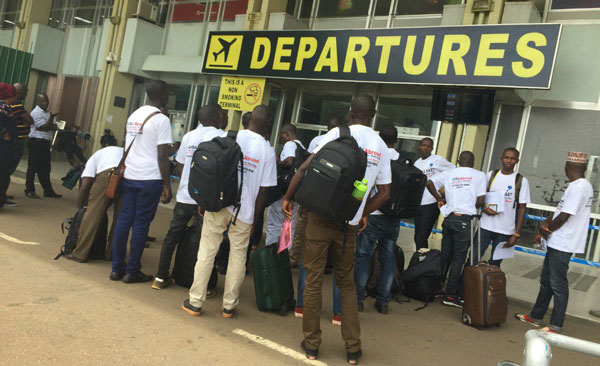The Government of Uganda has suspended planned mandatory Covid-19 test for all international travellers.
Compulsory Covid testing of all in-coming travellers, including citizens, was expected to start today. However, an inter-ministerial committee convened by Prime Minister Robinah Nabbanja cited unpreparedness and postponed implementation for two weeks.
While the postponement was tagged on readiness of the laboratories and other issues at the airport and testing centre, the government decision to compel travellers with a PCR tests done 72 hours before travel to pay $65 for second test upon arrival in Uganda faced outrage from frequent travellers, tour operators and some legislators.
The people who are against the proposed compulsory Covid test at the airport have criticised the move as perilous and alleged that the mandatory testing at Penial Beach Hotel, Entebbe, is aimed at enriching a few private companies that will be doing the tests. Some members of the inter-ministerial committee have privately criticised mandatory Covid-19 tests as uncalled for and cited lack of preparedness, abuse and delays.
Health Minister Dr Jane Ruth Aceng had on August 20 announced that all travellers arriving in Uganda, including citizens would be subjected to a mandatory PCR Covid test before they are cleared to enter the country. The decision to tighten rules sought to stop abuse and importation of deadly variants into the country.
Uganda has so far registered at least five Covid-19 variants, including the delta, and now seeks to contain the spread as the country struggles to vaccinate citizens.
Mr Emmanuel Ainebyoona, the Ministry of Health spokesperson, yesterday confirmed the postponement of mandatory testing.
“It [implementation of mandatory testing] has been deferred by two weeks because of the readiness of the laboratories and other issues. The inter-ministerial committee led by the Prime minister will visit the airport and testing site,’’ Mr Ainebyoona said without giving more details.
Dr Charles Ayume, the head of the Parliamentary Health Committee, told this newspaper that they will visit the testing centre next week to assess its capacity and also address issues of how the companies were selected.
“We don’t want people who have travelled for 12 hours to come and start standing in a three-hour queue to get tested. They will get frustrated. And when the facilities that are testing get overwhelmed, they will start compromising on quality. Quality will go down,” Dr Ayume clarified.
Currently, travellers spend around four hours to get their results, according to Test and Fly, one of the laboratories that provide Covid testing at the Airport. The mandatory testing will also be done in the 53 entry points of the country.
Dr Ayume, however, explained that the planned mandatory testing is an important initiative that should be implemented due to a looming threat of third wave of the pandemic.
“Carrying a negative Covid-19 test certificate doesn’t guarantee that you are not infected. You could be still incubating depending on when you did the test. We are trying to prepare for or prevent third wave,” he said.
Ms Margaret Muhanga, the State minister for Primary Healthcare, said earlier that the implementation would be important in curbing importation of new variants of the coronavirus.
The Kween County MP, Mr Abdi Fadhil Chemaswet, previously asked the ministry to review the “high” cost of mandatory Covid-19 PCR test by private laboratories.
“The private laboratories at Entebbe Airport are charging $65 to conduct the test; they are taken to some beach not even at the airport,” Mr Chemaswet said.
Ms Anna Merrifield, the European Union Deputy Head of Delegation, in a tweet on August 21, said “testing on departure, testing on arrival, testing on departure is draining and ultimately only benefits the private labs which are making a fortune.”
Like Mr Chemaswet, Ms Merrifield said the $65 is “very expensive in comparison to average earnings” in the country.
“How long will we be testing for, also people who are 2 x vaccinated [fully vaccinated], or recovered and could test positive for months? If you want to revive tourism, this won’t work,” she added.
The mandatory Covidd-19 means the private laboratories will experience a sharp increase in profits through the diagnosis. Previously, the laboratories were benefitting through testing all travellers before they leave the country.
For instance in June, the government statistics indicate that up to 40,137 people who left the country through Entebbe International Airport. This means at the rate of $65 per test, the laboratories amassed $2,608,905 (9.2b).
That same month, 29,209 arrivals were registered at the airport. This means that once mandatory testing starts for those arriving, the private laboratories will earn $1,898,585 (Shs6.7b) for the tests.
But Ms Muhanga said earlier that a serious traveller cannot complain about $65 for the Covid-19 test.
“Someone who has paid for an air ticket and can stay in a hotel where they will be paying $300 per night, but is not willing to pay $65 for Covid test is an unserious traveller,” the minister said. “Vaccination doesn’t mean you don’t have Covid-19. Even people who are fully vaccinated are getting infected. Vaccination only protects you from falling sick. We have to do this to prevent importation of new variants of the coronavirus,” she added.
Dr Henry Kyobe, the national incident manager for Covid-19, said the ministry has a clear criteria for selecting laboratories and that there are plans to increase the number of laboratories testing at the entry points.
The Association of Uganda Tour Operators (AUTO) said the directive of mandatory testing will have devastating effects on the tourism sector which has been disproportionately hit by the Covid-19 pandemic.
Ms Nancy Okwong, the AUTO spokesperson, said the mandatory testing is an inconvenience that would cause a decline in the number of tourists.
“Much as we recognise that it is important to have certainty regarding the status of our clients. The so many levels of [Covid] testing are quite a hindrance to us having tourists and clients coming to the country.”
Some policy analysts have also warned that mandatory testing might deter people from flying to the country unless for essential reasons and spark off counter measures by other countries.
![]()
























